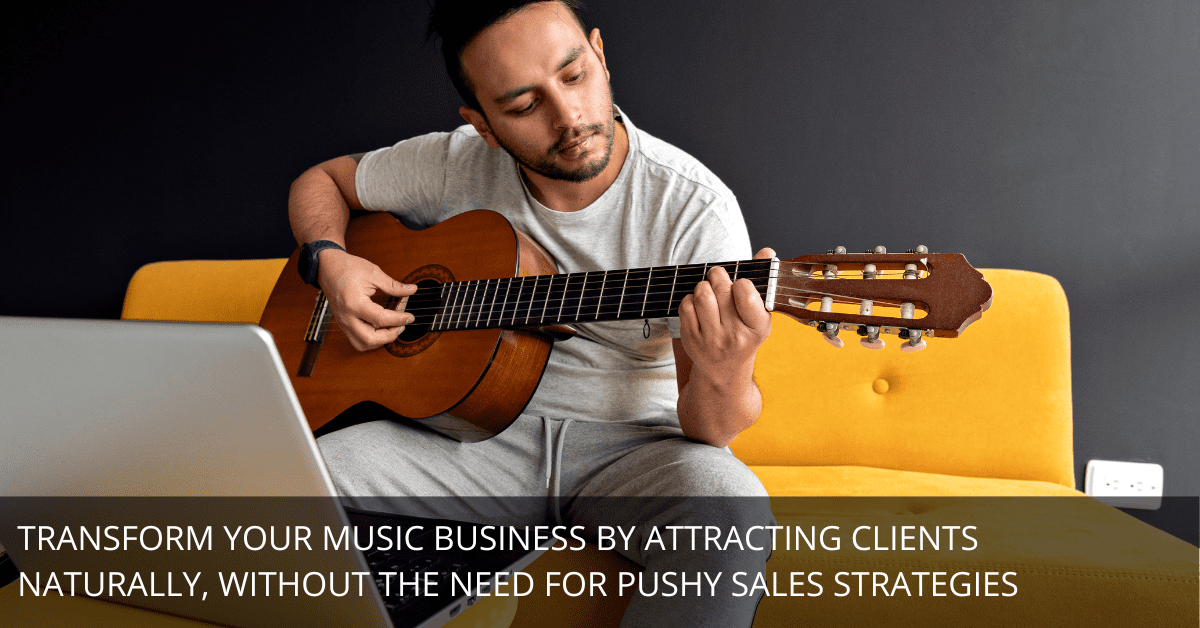
If you're a musician trying to grow your business—whether that’s composing, teaching, or performing—then you've probably felt the frustration of traditional marketing. Webinars, strategy calls, and high-pressure sales tactics tend to turn potential clients away.
The Encore Client System shifts away from these outdated methods and instead focuses on creating a system where people are excited to work with you. They willingly buy into your music services without needing to be convinced or pressured.
Let’s break down how you can use this system to attract clients like clockwork.
Shift from Selling to Attracting
Here’s the deal: nobody likes to be sold to. You know that feeling when someone’s pushing a hard sell? That same feeling comes up for potential students or clients when you use typical sales tactics. Instead of pushing, you need to pull—meaning, you should attract clients by giving them value upfront. Show them exactly what they’ll get, no tricks or hidden agendas.
Imagine you're teaching music lessons. Instead of trying to get people on a call where you "pitch" them your services, start by offering a free mini lesson online. Maybe it’s a short video on how to improve finger technique for piano players or a downloadable PDF with quick tips for vocal warm-ups. Now, you're demonstrating your expertise while they’re getting value immediately—no pressure, no stress.
Build Trust with Small Steps
Think about the last time you committed to something new. You probably didn’t dive in headfirst, right? Most people need small, safe steps before committing to anything serious. The same applies to your potential music students or clients.
So, how do you get them to trust you? You start small. Offer them something easy to say “yes” to—like a low-cost workshop, a downloadable guide, or access to a short training video. This microtransaction builds trust without requiring a major commitment.
For example, if you’re a composer, offer a short guide on how to write melodies like Mozart. If you’re a performer, share a behind-the-scenes video of you preparing for a performance. These small steps encourage people to take bigger steps later, like signing up for your paid course or attending a private concert.
The Power of Consistent Value
Consistency breeds trust. If you're sporadic with your content or marketing efforts, potential clients won’t know if they can rely on you. But if you're consistently showing up, delivering value, and making life easier for your audience, they’ll come to trust that you can help them with their music goals.
Here’s what to do next: Pick one platform where your audience hangs out (like Instagram, YouTube, or Facebook). Then, commit to posting something valuable once a week. This could be tips on learning an instrument, behind-the-scenes footage of your creative process, or even quick live Q&A sessions. The key is showing up regularly and giving them a reason to follow and engage with you.
Use Behavioral Psychology to Guide Decisions
Marketing isn’t just about the numbers; it’s about understanding how people think. By tapping into behavioral psychology, you can create an environment where clients feel comfortable and excited to make a decision.
For instance, when someone is checking out your offer, they’ll naturally have doubts. "Is this legit?" "Will this really help me?" Address these questions before they even ask. One way to do this is through social proof. Show testimonials from other students who’ve improved after working with you. Share stories of how your teaching method helped a struggling singer hit high notes they never thought they could reach.
You can also make your offer feel more urgent. Instead of just saying “Sign up whenever,” give them a reason to act now. Say, “This special rate for voice lessons is only available until Friday.” It creates a sense of urgency without being pushy.
Make It Easy to Say Yes
People don’t want to jump through hoops to hire you. If your website or sign-up process is confusing, you're losing potential clients. Simplicity is your best friend.
Think about the last time you booked a service online. The easier and faster it was, the more likely you were to complete the purchase, right? The same applies here. Whether you’re offering music lessons, performances, or sheet music, make sure your customers can sign up or purchase in just a few clicks.
Set up a simple website or landing page with one clear action: “Book Your First Lesson,” “Download Your Free Guide,” or “Join the Webinar.” Use tools like Calendly to make scheduling automatic, so potential clients don’t need to email back and forth to figure out a time that works.
Keep the Relationship Going
Once someone makes that first move—whether it's downloading a free guide, attending a webinar, or booking a lesson—that’s just the beginning. Too many musicians stop there, assuming the work is done. Big mistake. Your goal is to nurture that relationship and keep them coming back.
For example, after someone signs up for your free intro lesson, send them an email the next day with additional tips on how to improve their practice. A week later, follow up with an offer for a discounted package of lessons. By staying in touch and continuing to provide value, you're reinforcing the relationship and keeping yourself top-of-mind when they’re ready for the next step.
Scaling with Paid Ads
Now that you’ve set up the basics—free value upfront, trust-building, simple sign-ups, and consistent follow-ups—it’s time to scale. Paid ads are a great way to accelerate your client acquisition. But here’s the catch: You’ve got to make sure your economics are on point.
If you're spending $50 on Facebook ads to get someone to download your free guide, but you don’t have a clear path to converting them into a paying client, you're throwing money away. Make sure that every step of your funnel is aligned: free content → trust-building offer → upsell to a paid service (like lessons, workshops, or private performances).
Start with a small budget, say $10 a day, and target specific audiences—people interested in piano lessons, classical music, or vocal coaching. Once you see results, scale your ad spend gradually while tweaking your messaging based on the results.
Conclusion
The Encore Client System is perfect for musician entrepreneurs who want to grow their businesses without hard selling. By focusing on delivering value, building trust with small steps, and using smart marketing psychology, you can attract the right clients—those who are excited to work with you. From there, it’s about nurturing relationships and keeping them engaged so they keep coming back for more.
It’s time to leave the pushy sales tactics behind. Start pulling your clients in by being the expert they already know, like, and trust. Follow these steps, and you’ll build a music business that runs on autopilot—while you focus on what you love: composing, teaching, and performing.

